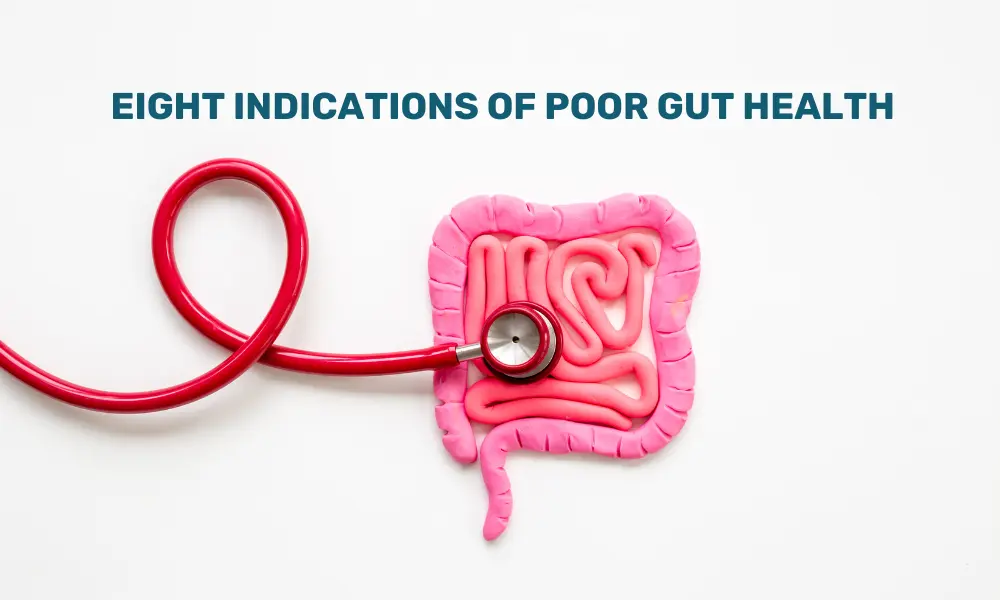Our digestive system is the most crucial and complex system in our bodies. Our gut health or digestion impacts our overall well-being. Our digestive system breaks down the food that we eat, absorbs nutrients, and eliminates waste—a critical process for overall health. But sometimes, this amazing system may be dysfunctional due to our lifestyle and dietary habits.
Then how does one know if our digestive system is compromised?
Certain signs may indicate poor gut health, which may include.
1. Frequent Illness: A poor digestive system can weaken our immune system, making us more vulnerable to colds, flu, and other infections.
2. Digestive Discomfort: If one experiences digestive discomforts like frequent gas, diarrhea, bloating, constipation, and heartburn often, then this indicates that the digestive system is unhealthy and struggles to function normally.
3. Skin Woes
-
Did you know our skin is a window to our gut health? Chronic skin conditions like eczema, acne, or rosacea can sometimes be linked to digestive imbalances. A study published in Gut Microbes suggested that an unhealthy gut can cause chronic inflammation throughout the body and show up on the skin, too.
-
The trillions of bacteria present in our gut affect the immune system and how it functions. An imbalance in these gut bacteria might contribute to skin conditions by affecting how our body responds to inflammation or allergens.
-
The gut plays a vital role in eliminating toxins from the body. If our digestive system does not function optimally, these toxins might build up and contribute to skin problems.
4. Frequent Fatigue: Feeling drained out often for no reason? This could be due to nutrient malabsorption, a problem when our digestive system isn’t functioning appropriately. Essential nutrients from food aren’t absorbed properly, leaving us feeling drained.
5. Mood Swings: The gut-brain connection is a much talked about topic in health research. A gut bacteria imbalance is often linked to mood swings, anxiety, and even depression.
6. Food Sensitivities: After consuming certain foods, food sensitivities or intolerances can cause digestive woes, such as bloating, gas, and diarrhea. These differ from food allergies involving a more severe immune system response.
7. Weight Fluctuations: Unexplained weight gain, weight loss or difficulty losing weight can sometimes be linked to digestive issues. Factors like malabsorption or changes in gut bacteria can cause weight fluctuation.
8. Trouble Sleeping: It may be hard to believe, but gut health can also affect sleep quality. Digestive discomfort or inflammation can disrupt sleep patterns, leaving us restless and tired.
However, if one consistently experiences these signs, it is important to consult a specialist to determine the underlying cause. They can help us create a personalized plan to get our digestive system back on track. Taking care of our digestive system is key to overall health and well-being. By listening to our body and addressing potential issues, we can keep the gut happy and our body functioning optimally!
FAQ on Gut Health
How do I know if my gut is unhealthy?
If one experiences digestive discomforts like frequent gas, diarrhea, bloating, constipation, and heartburn often, then this indicates that the digestive system is unhealthy and struggles to function normally.
How can I check my gut health?
An absence of pain and bloating are indicators of good gut health. Bowel movements are also decent indicators. Regular, pain-free bowel movements without much pushing indicate good gut health.
How do you know if your gut is wrong?
There can be a gut issue when an individual experiences frequent gas, bloating, irritated bowel, heartburn, and even unintentional weight gain or loss.
What are the symptoms of gut problems?
-
Digestive symptoms – such as constipation, bloating, gas, diarrhea, and heartburn.
-
Sleep disturbances or fatigue.
-
Mood fluctuation – such as high stress, low mood, or anxiety.





